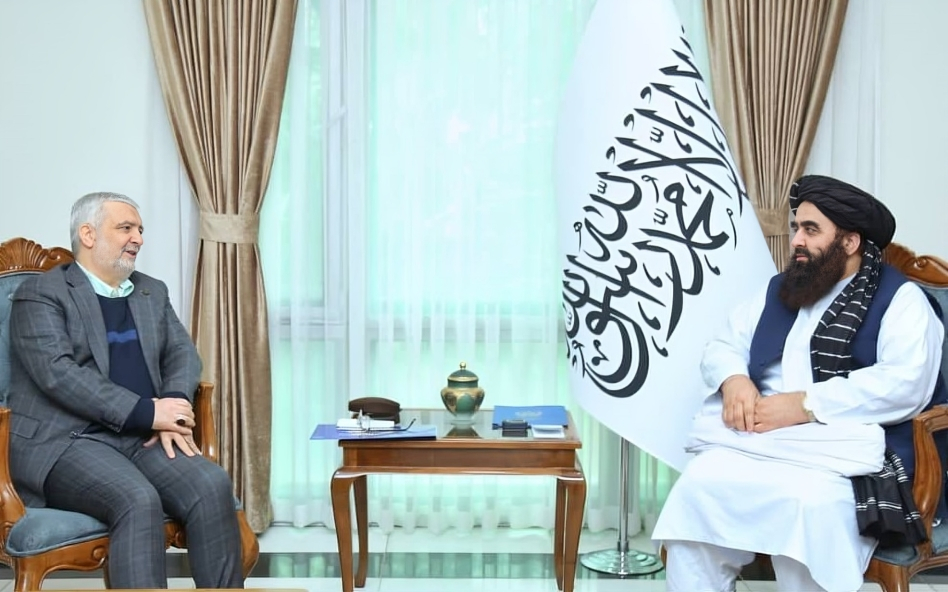The Iranian and Afghan officials have expressed readiness to boost bilateral trade and economic relations, discussing the construction of a new customs office and the signing of an agriculture deal.
On March 14, Taliban government’s acting minister for industry and commerce, Nooruddin Azizi, met with Iran’s deputy agricultural minister, Ali Reza Mohajer, and Hassan Kazemi Qomi, Iran’s special envoy to Afghanistan, according to the Taliban-run Bakhtar News Agency.
They deliberated on agricultural development in Afghanistan, the establishment of a customs office in Afghanistan’s Nimroz province, transit relations, and other means to enhance trade between the two countries.
On the same day, Mohajer and Mawlavi Sadr Azam Osmani, Afghanistan’s deputy minister of agriculture, signed a cooperation agreement aimed at improving productivity and best practices regarding agriculture and livestock in both countries.
Earlier, the Iranian special envoy to Afghanistan discussed bilateral relations, trade, transit, and recent political developments in the region in a meeting with Afghanistan’s Acting Minister of Foreign Affairs, Mawlavi Amir Khan Muttaqi, on March 13.
Muttaqi addressed the challenges faced by Afghans in Iran, the enhancement of Afghanistan’s electricity imports, the development of the Chabahar port, and the recent rainfall and floods in the provinces of Nimruz and Sistan-Baluchestan.
Tensions between Iran and Afghanistan have simmered over water sharing for over a decade, escalating after the Taliban group returned to power in August 2021. Iranian officials have repeatedly urged the Taliban government to release the water of the Helmand River into Iran as per the 1973 Helmand River Water Treaty, requiring Afghanistan to supply Iran with 26 cubic meters of water per second or 850 million cubic meters annually.
The Taliban government recently requested the establishment of an economic representation office at Chabahar Port, presented during a meeting between a visiting delegation from Afghanistan’s Ministry of Industry and Commerce and the secretary of Iran’s Free Zones Supreme Council on March 3.
Iran opened Chabahar Port in its southeastern Sistan-Baluchestan Province with India’s assistance in 2017, significantly reducing Afghanistan’s reliance on Pakistan’s Karachi port. Chabahar serves as a crucial alternative route for Afghan trade.
Chabahar is strategically important for Iran and other regional countries, particularly India. Tehran and New Delhi finalized an agreement on developing Chabahar Port in January 2024.
In July 2023, Tehran and the Taliban inaugurated a railway connecting Iran’s Khaf city with Herat in western Afghanistan, capable of carrying 5 million tons of goods and one million passengers annually.
Iran’s exports to Afghanistan total approximately $2 billion per year, mainly comprising machinery, construction materials, food, and oil. In contrast, Afghanistan’s annual exports to Iran stand at only $30 million.
During a four-day Afghan and Iranian trade exhibition that ended in Kabul on March 10, the two countries signed 30 contracts to enhance collaboration in transport and infrastructure projects, including connecting Iran to Afghanistan’s northern city of Mazar-e-Sharif and ultimately to Central Asia and China.
Despite close relations, ideological differences exist between Iran and the Taliban. While Shia clerics govern Iran, the Afghan Taliban adhere to a strict interpretation of Sunni Islam. Iran has frequently urged the erection of a border fence to control the influx of migrants and drugs and address security concerns.
The significant influx of Afghan migrants has raised economic and security concerns in Iran, prompting calls for the deportation of undocumented Afghans. Iranian authorities announced plans to deport millions of Afghan refugees labeled as “illegal” migrants.
Iran has implemented restrictions on Afghan migrants’ travel, residence, and employment in over half of its 31 provinces. Iran claims to host approximately 5 million Afghan migrants, although some Iranian media sources estimate the number to be as high as 8 million.
Border forces of the Taliban government have clashed with Iranian border forces several times since the Taliban took power in Afghanistan.
During a meeting in the western Afghan province of Herat on March 11, Taliban and Iranian border officials discussed ways to address border tensions and improve bilateral relations. They also addressed the construction of a road by Iran and issues at the Islam Qala border crossing, such as smuggling and security concerns.
Iran serves as a significant transit route for drugs originating in Afghanistan, destined for Europe. However, the Taliban administration denies reports of increased poppy cultivation in Afghanistan, urging the international community to support Afghanistan in eradicating drugs.







 President Ilham Aliyev shed light on the evolving contours of the peace process with Armenia during an international conference in Baku this week. ...
President Ilham Aliyev shed light on the evolving contours of the peace process with Armenia during an international conference in Baku this week. ...
 Azerbaijan and Armenia started the process of demarcation of their border on Tuesday, with the installation of the first border markers based on ge...
Azerbaijan and Armenia started the process of demarcation of their border on Tuesday, with the installation of the first border markers based on ge...
 Armenian sappers commenced on Monday mine-clearance operations in the territories adjacent to the Saint Mary Church in village of Voskepar (Armenia...
Armenian sappers commenced on Monday mine-clearance operations in the territories adjacent to the Saint Mary Church in village of Voskepar (Armenia...
 As the conflict between Ukraine and Russia escalates, the strategic importance of Kharkiv, Ukraine's second-largest city, has come sharply into focus.
As the conflict between Ukraine and Russia escalates, the strategic importance of Kharkiv, Ukraine's second-largest city, has come sharply into focus.
 President Aliyev emphasized the critical role of the North-South Transport Corridor in fostering transport cooperation between Azerbaijan and Russi...
President Aliyev emphasized the critical role of the North-South Transport Corridor in fostering transport cooperation between Azerbaijan and Russi...



